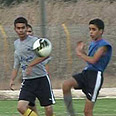
Playing for peace
צילום: רועי גזית
Soccer camp makes peace look feasible
Kids from Jenin meet Jewish, Arab-Israeli children for week of summer camp and tough questions
In the spirit of the recently concluded Soccer World Cup, 80 Palestinian, Arab-Israeli, and Jewish children graduated from a summer camp recently in which they learned coexistence through the popular sport.
The camp was part of a year-long program called Barkai-Jenin, held by the Maccabim Association. The children in the program, 40 of whom reside in Jenin and 40 of whom reside in Kibbutz Barkai, meet once every two months to share conversations and games. In honor of the World Cup a week-long soccer camp was held.
Kids take a break on the field (Photo: Roee Gazit)
As part of the program, many of the Jenin children visited the seashore for the first time in their lives, when counselors took them to a Caesarea beach. While attending the camp they slept at the Jewish children's homes – another first.
Haytam Ayish, who runs the Modern Language Center of Jenin, recounted some of their experiences. "One of the children, who was a guest at his Jewish friend's house, slept in his sister's room, a soldier who remained at the base for the weekend," he said.
"When she called home to wish her family Shabbat Shalom, it was a little strange for her to hear that while she was in Gaza, a boy from Jenin was sleeping in her bed."
'Kids still have mental flexibility'
Ibrahim Abu-Mokh, who serves as a camp counselor, said the children had to struggle at first to find a common language. "Soccer is a universal language," he said. "At first they spoke in signs, or one would score a goal and another would call his name and say, 'Kifak'. That's how friendships started."
As time went on, the children learned to accept each other, he said, recounting a story about a Jewish boy who thought at first that one of the Palestinian children had an explosive device under his shirt. On another occasion, a Palestinian boy wanted his Jewish friends to promise none of them would join the IDF and shoot him.
Eventually the children learned how to deal with their fears, and became friends, the counselors say. Now they keep in touch through e-mails and Facebook.
Ori Winitzer, who founded the Soccer for Peace organization that funds the camp, says it prompted the idea for a year-long program. Winitzer, a New Yorker whose family left Israel when he was a young child, says he had become frustrated by the situation in the country.
"I wanted to do something optimistic and hopeful," he says. "We chose children because they haven't yet undergone a process of incitement, and still retain mental flexibility. Soccer contains more than language, or an allegory for peace. Soccer is the way these children actually make peace – peace that overflows from the field into their personal lives."
On one of the sunny camp days, the children watched a documentary on the life of peace activist Ismail Khatib. His son, 12-year old Ahmed, was killed by IDF troops who thought he was a terrorist because he was playing with a toy gun.
Khatib decided to donate his son's organs to six Israeli children. "As a man who lost his son, I know that the only way to protect our children is to make peace," he said.
We need to walk hand in hand, Jews, Muslims, Bedouin, and Christians, to do something for life, for the children, and to stay away from war and destruction."
- Follow Ynetnews on Facebook











